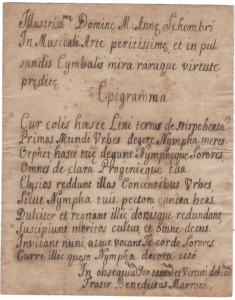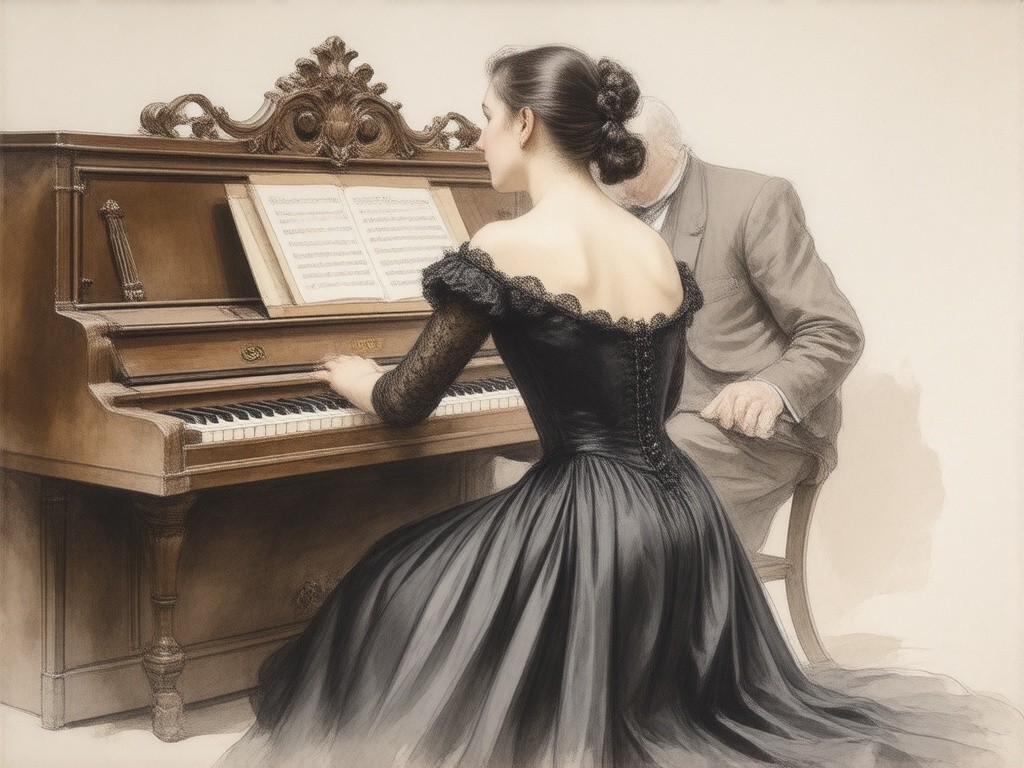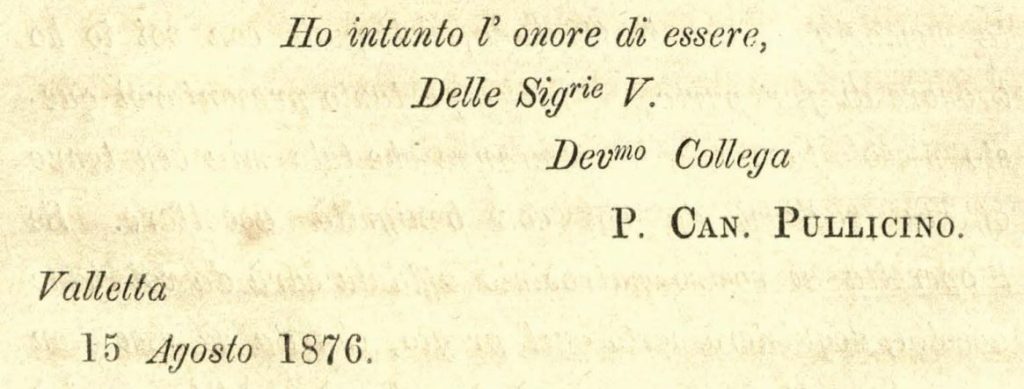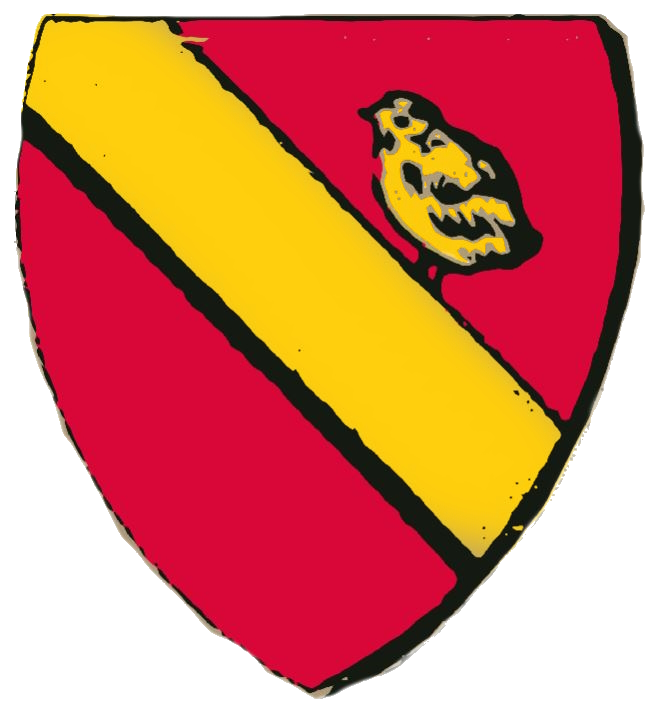
To the Most Illustrious Lady M. Anne Schembri, most skilled in the Musical Art, and endowed with wonderful and rare virtue in playing the Cymbals.
Epigram.
Why do you dwell in these distant lands, you of blessed lineage?
You deserve to live in the foremost cities of the world, Nymph.
There reside the Nymphs and your sisters of Orpheus,
All from your noble lineage.
The cities of Elysium render them with harmonies,
Just as you bring joy to all hearts, Nymph.
There, they rule sweetly and overflow with gifts,
They receive deserved reverence and all honor.
Now your sisters invite and call you with their hearts
Run there, I beg you, beautiful Nymph, quickly.
In obedience to God alone and Virtue dedicated
Brother Benedictus Marroni

Don Paulo’s recollections of his mother
Below is a translation from a biographical booklet (Notizia Biografica di Francesco Azopardi, Maestro di Cappella della Chiesa Cattedrale di Malta, 1876) written in Italian by Don Paulo Pullicino. Although the primary purpose of the booklet is to honour the famous composer Francesco Azzopardi (1748–1809), he includes some passages about his mother, Signora Marianna Schembri. Note that the headings are mine.
An exception is made for a girl
Although he [Maestro. Azzopardi] was firmly committed to not engaging in teaching females, he had made an exception in favor of just one; whose extraordinary disposition he admired so much that he could not resist the sense of duty that almost obligated him to continue her musical education. This chosen student was the young Miss Marianna Schembri, daughter of Judge Dr. Giovanni Schembri. Who, in the early years after the so-called French blockade, practicing as a judge in the courts of Notabile, was living in the same place where Maestro Azzopardi also lived.
The best education possible
Judge Schembri, eager to give his only daughter the best education possible, had arranged for her to also receive music lessons. She first received these lessons from a nephew of the aforementioned Maestro Azzopardi, and despite the mediocre ability of the instructor, she had shown extraordinary aptitude to make progress in the art, so much so that in a short time having demonstrated prodigious disposition to that study, Maestro Azzopardi clearly saw how she needed guidance superior to what she had. He therefore made the decision to become her teacher himself.
For several years she remained under Azzopardi’s direction, and driven not only by her natural genius for music, but also assisted by the skillful direction of such an eminent instructor, she made rapid and prodigious progress in the art.
In a short time, she reached such a high degree of perfection in piano playing and in the art of accompaniment as to be considered one of the greatest glories of the illustrious Maestro who had guided her in her studies.

Her early childhood
And here let us be permitted to make a brief digression and pay due tribute of respect to this beloved mother, who through her rare virtues had become an ornament both to her family and to those who had educated her. Born in 1793, she was the daughter of the aforementioned Dr. Schembri, a jurisconsult of great reputation, acquired both through his knowledge and through the noble and benevolent character that distinguished him. Having become a judge in the civil courts while young, he had later preferred the position of Assessor to the Archbishop of Malta, Monsignor Fra Ferdinando Mattei: an office he held until the time of his death, which occurred on March 10, 1819.
A dear father’s care
Dr. Schembri, having lost his wife at a very young age, had only to concern himself with the education of his only daughter, which he wanted to make complete in every way; not by giving her a superficial and worldly education, but in all ways rigorous, as befitting an honorable young lady. And the young girl did not fail to respond well to her father’s care. As she grew in age, she adorned herself even more with virtue. Refinement and modesty, accompanied by a love of study and piety, were virtues that quickly took root in her. And since the natural talent manifested itself in her with a marked disposition to the study of musical art, one did not want to leave undeveloped this noble gift, which she showed she still possessed.
This particular inclination of hers toward the study of music was observed to be so extraordinary that (as was already said) it had moved Maestro Azzopardi to make in his practices this unique exception, namely to grant to her the singular privilege of being among his chosen pupils. Under the direction of such a great Master, she made, especially in piano playing, in a very short time more than rapid progress.
Her complete mastery of music
These were truly such as to make her, despite her habitual reserve, desired in the best societies of the time, and earned her everyone’s admiration. Nor should it be believed by chance that such admiration was the effect of the scarcity in those times in our land of disciples in classical music; on the contrary, there was a great abundance of them.
Schembri became so admired because truly rare was the mastery she showed in the art. She executed with precision extremely difficult compositions. Great was the command she had in setting and marking the tempo of the pieces that were presented to her to play. The force and at the same time the delicacy of expression that she gave to whatever she made the instrument feel, were such as to make everyone remain beside themselves with rapture at her playing. No less mastery did she demonstrate in accompanying singing; which also showed how much she had drawn from Maestro Azzopardi’s teachings in the theory of harmony.
An unexpected early passing
Schembri married Dr. A Pullicino in 1814 (1), and although very protective of her children, occupying herself with great care in raising them well, nevertheless until the time of her death, which occurred on March 31, 1831, at the still young age of just 37 years, she had never neglected to cultivate the noble art in which she was so distinguished.
* * *

My notes:
(1) She was born in the year Louis XVI was executed, and married on 24 August 1814, after the 1813 plauge, and at the tail-end of the Napoleonic wars.
